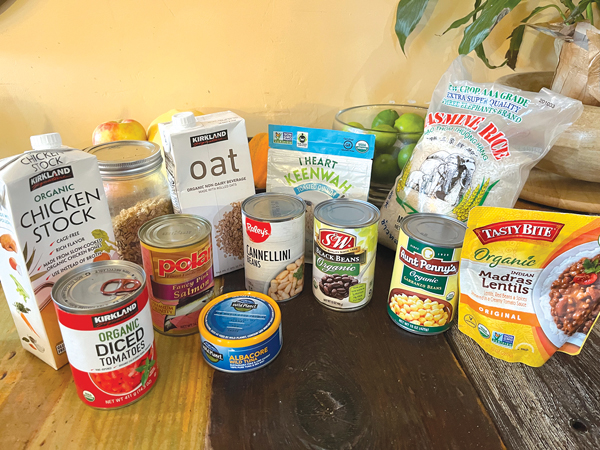 Non-perishable foods to pack in the event of an evacuation. | Priya Hutner
Non-perishable foods to pack in the event of an evacuation. | Priya Hutner
The risk of wildfires is terrifying and the time to prepare for the possibility of fire is now. Along with other emergency preparations, it is essential to ensure that food and supplies are on hand in the event of an evacuation and upon returning home. Healthy foods and snacks can be beneficial during a stressful situation.
Emergency service organizations recommend having a three-day supply of non-perishable food and water in your Go Bag. It is also recommended to have at least two weeks’ worth of food in your pantry in case of a disaster when there may be no power and there will be a lack of resources in the community.
Read Tahoe Guide’s 4th Annual Wildfire Preparedness Guide
Food for Go Bags
Have these items already packed in a Go Bag for each family member:
• Water. 1 gallon per person, per day. Include water for pets.
• Protein bars
• Dried fruit & nuts
• Supplies for sandwiches
• Bread or crackers with peanut butter and jelly
During an evacuation
If you have a cooler and ice packs, take things in the fridge that don’t need to be cooked; they may otherwise go bad if there is a power outage.
Cheese, deli meats, carrots and celery kept in a cooler will help extend the life of perishables. Fresh fruits like apples, stone fruits and citrus do not need refrigeration. Seaweed snacks are loaded with vitamins and are good for you. Consider taking a thermos of hot water for tea or coffee.
Stock up for a disaster
When you return home after an evacuation, there might not be power and grocery stores and gas stations might be closed. A gas grill with extra propane or a camp stove can help with meal preparation.
Depending on how long the evacuation lasts and if the power went out, many items in the fridge may have gone bad. Freezer items may or may not be good. If the freezer is still cold, then use those items first. If ice is available, use coolers to help keep items cool. Be mindful and smell anything questionable. Cook foods in the freezer that may be defrosted.
Stock the pantry
There are several things to keep in the pantry that have a long shelf life and need no refrigeration.
• Beans, grains (rice and oats), cereal, dried nuts and fruit, crackers and tortillas.
• Some meats, like salami, do not need refrigeration.
• Shelf-stable products like tinned fish, chicken or meats.
• Shelf-stable milk or nondairy nut milk.
• Soup stocks.
• Dehydrated vegetables (purchased or made with a home dehydrator) can be reconstituted with water and cooked in soups or grains.
• Squash, potatoes, sweet potatoes, onions and other root vegetables do not need refrigeration and can be cooked on a grill either in water or grilled.
• MREs, dehydrated backpacking meals and healthy shelf-stable meals.
• Storage in Tahoe can be an issue with bears. Never leave coolers or food outside or in your car.
Rice and Bean Tortillas
From the kitchen of Priya Hutner
1 can of black beans
1 small onion
2 cloves garlic
2 t salt
1 t cumin
1 C cooked rice
1 C dehydrated veggies like corn, carrots & peas
Tortillas
Hot sauce
Heat a pot on the grill and add oil. Cook onions and garlic for 3 to 5 minutes. Add beans and dehydrated or canned vegetables (rehydrate in water for 5 minutes before using). Stir and warm through.
Add cooked rice to the pot and mix well. Serve in warmed tortillas.

